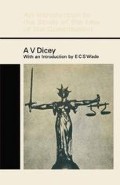Abstract
The rights already treated of in the foregoing chapter, as for example the right to personal freedom or the right to free expression of opinion, do not, it may be between suggested, properly belong to the province of constitutional law at all, but form part either of private law strictly so called, or of the ordinary criminal law, Thus A’s right to personal freedom is, it may be said, only the right of A not to be assaulted, or imprisoned, by X, or (to look at the same thing from another point of view) is nothing else than the right of A, if assaulted by X, to bring an action against X, or to have X punished as a criminal for the assault. Now in this suggestion there lies an element of important truth, yet it is also undoubted that the right to personal freedom, the right to free discussion, and the like, appear in the forefront of many written constitutions, and are in fact the chief advantages which citizens hope to gain by the change from a despotic to Chapter a constitutional form of government. VIII.
See Forsyth, Cases and Opinions in Constitutional Law (1869), ch. vi, and Appendix; Stephen, History of the Criminal Law (1883), vol. i, pp. 201–216; The King v. Pinney (1832) 5 Car. & P. 254; K. & L. 418; The Queen v. Vincent (1839) 9 Car. & P. 91; The Queen v. Neale (1839) 9 Car. & P. 431; Keir & Lawson, Cases in Constitutional Law (4th ed., 1954), pp. 421–434, especially for later Irish cases; Law Quarterly Review, vol. xviii (1902), pp. 117–151, for four articles on the subject.
Access this chapter
Tax calculation will be finalised at checkout
Purchases are for personal use only
Preview
Unable to display preview. Download preview PDF.
Notes
Mommsen, Abriss des rörnischen Staatsrecht (1893), p. 672.
Cf. Jennings, The Law and the Constitution (4th ed., 1952), pp. 297–298.
See Hearn, Government of England (2nd ed., 1887), ch. iv; of. Gardiner, History of England, vol. x (1884), pp. 144, 145.
See Loi sur l’état de Siège, 9 Aout, 1849, Roger et Sorel, Codes et Lois (1882), p. 436; Loi 3 Avril, 1878, art. 1, and generally Duguit, Manuel de Droit Public français; Droit Constitutionnel (1907), para. 76, pp. 510–513; and para. 130, p. 926. See p. 292, post.
Cf. Miller v. Knox (1838) 6 Scott 1. See Report of the Committee (including Bowen, L.J., and R. B. Haldane, Q.C.), appointed to inquire into the Disturbances at Featherstone in 1893 [C. 7234].
See Stephen, History of the Criminal Law (1883), vol. i, pp. 202–205.
Roger et Sorel, Codes et Lois usuelles (1882), v° état de siège, pp. 435, 436.
Copyright information
© 1979 Palgrave Macmillan, a division of Macmillan Publishers Limited
About this chapter
Cite this chapter
Dicey, A.V. (1979). Martial Law. In: Introduction to the Study of the Law of the Constitution. Palgrave Macmillan, London. https://doi.org/10.1007/978-1-349-17968-8_9
Download citation
DOI: https://doi.org/10.1007/978-1-349-17968-8_9
Publisher Name: Palgrave Macmillan, London
Print ISBN: 978-0-333-05255-6
Online ISBN: 978-1-349-17968-8
eBook Packages: Palgrave Social & Cultural Studies CollectionSocial Sciences (R0)

